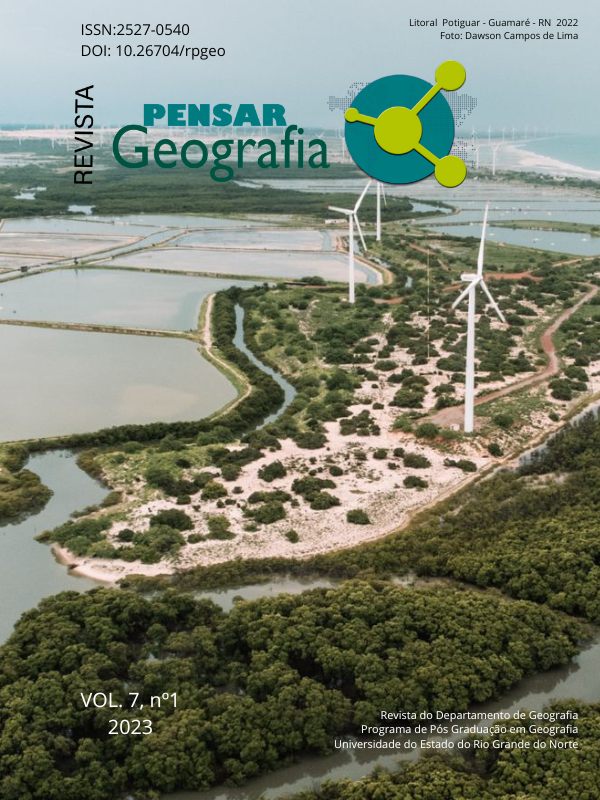CHALLENGES OF SCHOOL GEOGRAPHY: THE ELABORATION OF THE TEACHING PLAN ANCHORED IN CURRICULUM PROPOSITIONS
DOI:
https://doi.org/10.26704/pgeo.v7i1.4676Keywords:
Plano de ensino. Conteúdos. Ensino de geografia.Abstract
The study aims to investigate, through the analysis of teaching plans, whether Basic Education teachers are able to distinguish the contents of School Geography Teaching from the objects of knowledge indicated by the National Common Curricular Base - BNCC structured in a format similar to that proposed by Curricular Document of the State of Rio Grande do Norte - Elementary School, using the curricular organization chart. The research is characterized as a qualitative documental analysis with data collection of five teaching plans of the curricular component Geography of Elementary School - Final Years, prepared by licensed teachers in this curricular component, having been developed in schools of the State Teaching Network of Rio Grande do Norte, located in the city of Caicó, during the 2021 school year. When analyzing the data collected in the documents shared by the teachers, it was observed whether they presented the categories and inclusion criteria that met the research object, these they were organized and systematized in matrices to facilitate data analysis. The results show that of the eight shared and analyzed teaching plans, only five meet the criteria established for the research, of these, three presented as a teaching objective the contents foreseen for the academic year of enrollment and two presented interdisciplinary development with restriction in the approach of geography contents in their development. It is concluded, in general, that on average 60% of the teaching plans of the analyzed Geography curricular component present the contents in a clear and objective way, depending on the possibility of developing the competences foreseen for the foreseen enrollment year.
Downloads
References
BRASIL. Base Nacional Comum Curricular (BNCC). Brasília: MEC/Consed/Undime, 2017. Disponível em: < http://basenacionalcomum.mec.gov.br/abase/ >. Acesso em: 11 dez. 2022.
GIL, A. C. Como elaborar projetos de pesquisa. 4 ed. São Paulo: Atlas, 2002.
LIBÂNEO, José Carlos. Didática. São Paulo: Cortez, 1994 (Coleção magistério 2° grau. Série formação do professor).
MORAIS, I. R. D; GARCIA, T. C. M.; SOBRINHO, D. M. S. Educação geográfica: ensino e práticas, Natal: EDUFRN, 2014.
PERRENOUD, Philippe. Desenvolver competências ou ensinar saberes? A escola que prepara para a vida. Porto Alegre: Penso, 2013.
RIO GRANDE DO NORTE. Secretaria de Estado da Educação e da Cultura. Documento curricular do Estado do Rio Grande do Norte – Ensino Fundamental. Natal: Offset, 2018.
RIO GRANDE DO NORTE. Secretaria de Estado da Educação e da Cultura. Normas para reorganização do planejamento curricular do ano de 2020. Disponível em: <http://diariooficial.rn.gov.br/dei/dorn3/docview.aspx?id_jor=00000001&data=20200505&id_doc=681841 >. Acesso em: 11 dez. 2022.
SACRISTÁN, J. Gimeno; GÓMEZ, A. I. Pérez. Compreender e transformar o ensino. 4.ed. Porto Alegre: ArtMed, 1998.
VASCONCELLOS, C. S. Elaboração do plano de ensino-aprendizagem e projeto educativo. São Paulo: Libertad, 1995.
VASCONCELLOS, C. S. Planejamento: Projeto de Ensino-Aprendizagem e Projeto Político-Pedagógico. 8. ed. São Paulo: Libertad, 2000.
ZABALA, Antoni; ARNAU, Laia. Como aprender e ensinar competências. Porto Alegre: Artmed, 2010.







